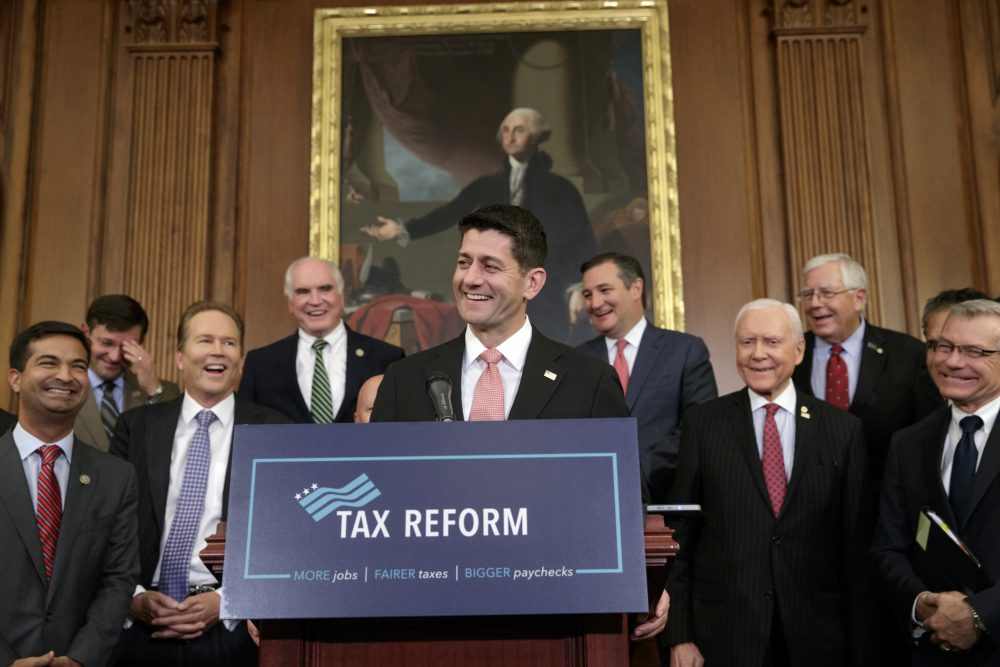Advertisement
Commentary
Tax Reform? Yes. The GOP Tax Cut? No.

Like many Americans, I long for a simpler tax code to drain the pain out of every April 15: a postcard-sized return, with just a few brackets and the lowest feasible rates, and shorn of social-engineering deductions and credits, including the indefensible one for mortgage interest.
But when President Trump and Republican leaders outlined a tax blueprint to achieve many of these goals, my disbelief alarm went off at the president’s promise that the full plan “will be a very, very powerful document.” Yeah, like that beautiful infrastructure plan and beautiful, beautiful health plan.
Given what we know so far about this “reform” (many details remain to be worked out), rational Americans can muster only one response: Yes to real reform, but stop the GOP plan. Now.
The Republicans’ fanatical attempts to repeal Obamacare, a law that insured 20 million and is working better than the GOP claimed, proved the party cares little for average Americans. Mirabile dictu, its tax plan would bestow most of its tax cuts on wealthy folks who don’t need them, needlessly bleeding the Treasury.
The rate paid by the highest earners would drop from 39.6 percent to 35 percent (though Trump signaled he’d consider a fourth, higher bracket). The estate tax, paid only by a handful of wealthy families, would be given its own funeral, as would the alternative minimum tax, designed so the wealthy can’t deduct their way into paying little or no tax.
The plan cuts the taxes on “pass-through” income earned by business like hedge funds, real estate developers and law firms. Since most small businesses earn so little that they already pay less than the proposed 25 percent rate, this cut would mostly benefit millionaires. (I promise not to question the president’s character by pointing out this tax cut would benefit him. Wait — oops.)
In the name of job creation, the top corporate tax rate would fall to 20 percent from 35. Trump and other GOP leaders say we have the world’s highest corporate rate. But while that’s true nominally, the rate corporations actually pay is less, thanks to deductions and credits they get.
Purging such loopholes, for corporations and individuals, is the real simplification of true reform. Does the GOP plan measure up? It would appear to kill itemized deductions except for mortgage interest and charitable giving. We’ll have to see if party leaders wilt against all-but-certain, furious lobbying to preserve the breaks. And a better plan would at least cap the mortgage deduction, which drives inequality.
Keep in mind that the GOP’s supply-side philosophy — tax cuts for wealthy “job creators” always generate jobs — doesn’t hold water. Finally, even conservative think tanks predict the plan would blow up the deficit, adding to the fiscal fraud behind the marketing.
And what of the little guy Trump says he wants to help? The tax rewrite would dribble a few crumbs, doubling the standard deduction to $12,000 for individuals and $24,000 for couples. Of course, that’s little comfort to the 45 percent of households who make so little that they don’t owe taxes.
And the bigger deduction would balance a tax hike on the lowest bracket, to 12 percent from the current 10. Meanwhile, a reworking of the personal deduction for taxpayers who itemize would leave that doubled deduction less helpful than advertised.
There are two realities facing Congress’s tax writers. First, as even the libertarian author Charles Murray accepts, government will help the least among us, because “the society is too rich to stand aside and say, ‘We aren’t going to do anything for people in need.’”
Second, that inevitable helping hand must come gloved in tax revenue to pay for it. Indeed, the 19th-century economist Adolph Wagner predicted that ever-richer societies would have ever-rising taxes, as citizens demanded things that required government action, from defense to education to medical care. Combatting inequality today only reinforces Murray and Wagner’s insights.
Progressives nodding in agreement with all of the foregoing won’t be any more enthusiastic about real tax reform. They’ll point out that eliminating certain breaks (the deduction for state and local taxes, for instance) would hurt middle-class folks in high-tax states like New York and California. But larding the tax code with breaks, good and bad, is what made it incomprehensible in the first place.
Better to marry a simpler, transparent code with direct government spending on average folks’ needs. That also might erode some of the distrust many Americans harbor about the tax code’s fairness; who trusts something they can’t understand?
But as the Obamacare soap opera showed, government helping the needy isn’t something Republican leaders are keen on. There’s even talk of tying yet another Obamacare repeal effort to the tax cut. It’s going to be a long fall and winter.
